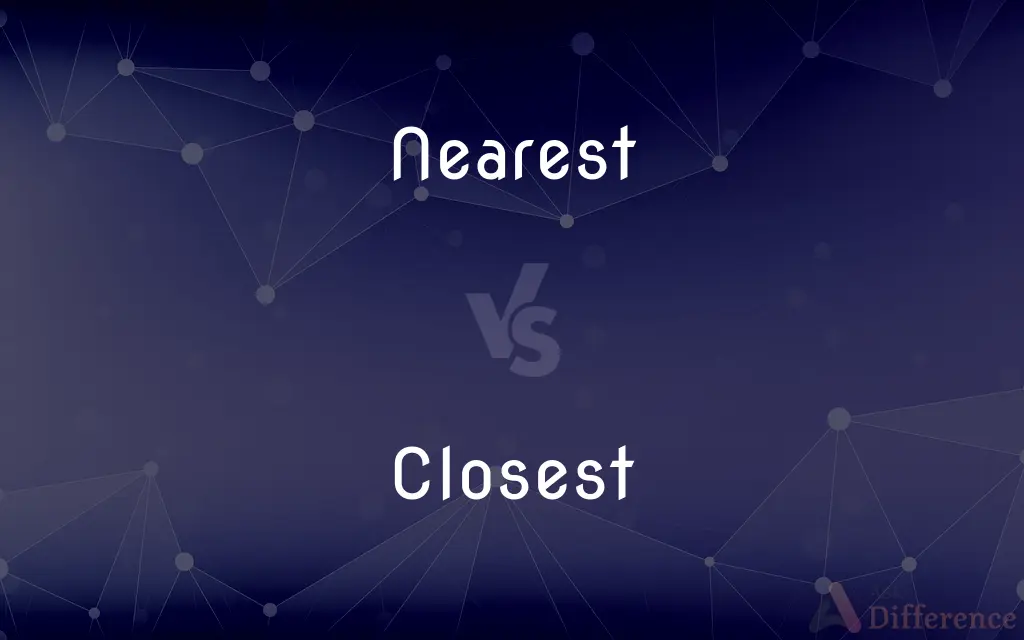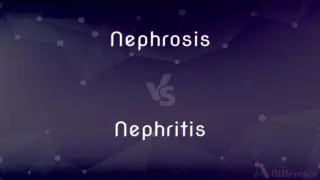Nearest vs. Closest — What's the Difference?
Edited by Tayyaba Rehman — By Fiza Rafique — Updated on October 27, 2023
"Nearest" often refers to distance in a literal or figurative sense, while "Closest" can emphasize relationship or proximity, either physical or emotional. Both words can sometimes be used interchangeably.

Difference Between Nearest and Closest
Table of Contents
ADVERTISEMENT
Key Differences
"Nearest" is a term that primarily focuses on distance. Whether this distance is literal, as in physical space, or figurative, as in a concept, "Nearest" addresses that which is most immediately adjacent or next in sequence. "Closest", on the other hand, while it can also refer to physical distance, often leans more towards emphasizing relationship or proximity in terms of similarity or relationship.
In practical usage, "Nearest" might be used to refer to the next town on a map, or the next item in a series. "Closest", meanwhile, might be used to describe a dear friend or the idea that best aligns with someone's thinking. Even in these examples, it's evident that there's overlap in their usage.
When describing objects or places, both "Nearest" and "Closest" can sometimes be used interchangeably without a significant change in meaning. For instance, "the nearest gas station" and "the closest gas station" would be understood in the same way by most listeners or readers.
However, when delving into abstract or emotional contexts, "Closest" tends to be the more fitting choice. Saying someone is your "closest confidant" conveys a depth of relationship that "nearest confidant" might not.
In summary, while "Nearest" and "Closest" have overlapping meanings and can often be swapped without causing confusion, they each have their unique nuances. "Nearest" leans towards proximity in a sequence or location, while "Closest" often emphasizes depth of relationship or similarity.
ADVERTISEMENT
Comparison Chart
Primary Meaning
Distance in a sequence or location
Proximity in relationship or similarity
Common Usage
"Nearest store"
"Closest friend"
Abstract Context
Less common to use in abstract ideas
Often used to describe abstract relationships or similarities
Emotional Context
Rarely used to describe emotional proximity
Commonly used to describe emotional relationships
Interchangeability
Often interchangeable with "Closest" in physical references
Sometimes interchangeable with "Nearest", especially in abstracts
Compare with Definitions
Nearest
Closest in distance or position.
The nearest store is three blocks away.
Closest
Most similar or alike.
This shade is the closest to the one I saw online.
Nearest
Most closely resembling.
This color is the nearest match to what I want.
Closest
Most confidential or secretive.
This is my closest guarded secret.
Nearest
Imminent or impending.
The project's end is nearest now.
Closest
Being near in space or time. See Usage Note at redundancy.
Nearest
Directly adjacent without anything intervening.
She sat in the nearest chair to the door.
Closest
Being near in relationship
Close relatives.
Nearest
Next in a sequence or order.
The nearest available appointment is tomorrow.
Closest
Bound by mutual interests, loyalties, or affections; intimate
Close friends.
Nearest
To, at, or within a short distance or interval in space or time
Moved the table nearer to the wall.
As graduation draws near.
Closest
Having little or no space between elements or parts; tight and compact
A close weave.
Nearest
Just about; almost; nearly
Was near exhausted from the climb.
Closest
Being near the surface; short
A close haircut.
Nearest
With or in a close relationship
It turns out we are near related.
Closest
Being on the brink of
Close to tears.
Nearest
Close in time, space, position, or degree
Near neighbors.
Near equals.
Closest
Decided by a narrow margin; almost even
A close election.
Nearest
Closely related by kinship or association; intimate
A near relative.
A near and dear friend.
Closest
Faithful to the original
A close copy.
Nearest
Nearly occurring but not actually happening
A near victory.
A near disaster.
Closest
Very attentive; rigorous; thorough
A close reading.
Close supervision.
Nearest
Just barely avoided
A near hit by the incendiary bomb.
Closest
Shut; closed.
Nearest
Closely corresponding to or resembling an original
A near likeness.
Closest
Shut in; enclosed.
Nearest
Closely resembling the genuine article
A dress of near satin.
Near silver beads.
Closest
Confining or narrow; crowded
Close quarters.
Nearest
Closer of two or more
Take the near street and then turn right.
Closest
Fitting tightly
Close garments.
Nearest
Being on the left side of an animal or vehicle.
Closest
Warm and humid or stuffy
Close weather.
A close room.
Nearest
Being the animal or vehicle on the left.
Closest
Confined to specific persons or groups
A close secret.
Nearest
Short and direct
The nearest route to town.
Closest
Strictly confined or guarded
Kept under close custody.
Nearest
(Archaic) Stingy; parsimonious.
Closest
Secretive; reticent
Was close about her personal life.
Nearest
Close to
An inn near London.
Closest
Giving or spending with reluctance; stingy
He is known to be close with his money.
Nearest
To come close or closer to
The plane neared the terminal.
Closest
Not easily acquired; scarce
Money was close.
Nearest
To draw near or nearer; approach
As the holiday nears.
Closest
(Linguistics) Pronounced with the tongue near the palate, as the ee in meet. Used of vowels.
Nearest
Closest to.
Mercury is the planet nearest the Sun.
Closest
Marked by more rather than less punctuation, especially commas.
Nearest
(superlative of `near' or `nigh') most near
Closest
To move (a door, for example) so that an opening or passage is covered or obstructed; shut.
Nearest
(superlative of `near' or `close') within the shortest distance;
That was the time he came nearest to death
Closest
To bar access to
Closed the road for repairs.
Closest
To fill or stop up
Closed the cracks with plaster.
Closest
To stop the operations of permanently or temporarily
Closed down the factory.
Closest
To make unavailable for use
Closed the area to development.
Closed the database to further changes.
Closest
To bring to an end; terminate
Close a letter.
Close a bank account.
Closest
To bring together all the elements or parts of
Management closed ranks and ostracized the troublemaker.
Closest
To join or unite; bring into contact
Close a circuit.
Closest
To draw or bind together the edges of
Close a wound.
Closest
(Sports) To modify (one's stance), as in baseball or golf, by turning the body so that the forward shoulder and foot are closer to the intended point of impact with the ball.
Closest
To complete the final details or negotiations on
Close a deal.
Closest
(Archaic) To enclose on all sides.
Closest
To become shut
The door closed quietly.
Closest
To come to an end; finish
The book closes on a hopeful note.
Closest
To reach an agreement; come to terms
We close on the house next week.
Closest
To cease operation
The shop closes at six.
Closest
To be priced or listed at a specified amount when trading ends
Stocks closed higher on Monday.
Closest
To engage at close quarters
Closed with the enemy.
Closest
To draw near
The orbiter closed with the space station in preparation for docking.
Closest
To come together
My arms closed around the little child.
Closest
(Baseball) To finish a game by protecting a lead. Used of relief pitchers.
Closest
The act of closing.
Closest
A conclusion; a finish
The meeting came to a close.
Closest
(Music) The concluding part of a phrase or theme; a cadence.
Closest
(klōs) An enclosed place, especially land surrounding or beside a cathedral or other building.
Closest
(klōs) Chiefly British A narrow way or alley.
Closest
(Archaic) A fight at close quarters.
Closest
In a close position or manner; closely
Stayed close together.
Closest
(superlative of `near' or `close') within the shortest distance;
That was the time he came nearest to death
Closest
Having the least physical distance.
The closest gas station is five miles ahead.
Closest
Most intimate or personal.
She's my closest friend in the city.
Closest
Being tight or well-fitted.
The door was the closest fit for the frame.
Common Curiosities
Is "Nearest" always about physical distance?
No, it can also refer to figurative distance like concepts or ideas.
Is "nearest" only used in spatial contexts?
No, it can be used in sequences, orders, or concepts as well.
Would "nearest relative" mean the same as "closest relative"?
"Nearest relative" might imply next of kin by law, while "closest relative" can indicate a deep emotional bond.
Which term is better for describing emotional relationships?
"Closest" is generally more apt for emotional contexts.
Can "Nearest" and "Closest" be used interchangeably?
Often they can, especially when referring to physical proximity, but not always.
Is "nearest" more objective than "closest"?
Often, yes. "Nearest" usually leans towards measurable or observable distances.
Is "closest" used more in personal or emotional discussions?
Yes, it often leans towards personal or emotional discussions, such as "closest confidant."
Can "Closest" refer to emotional ties?
Yes, "Closest" can refer to deep relationships or emotional proximity.
Does "closest" always imply a deep bond or relationship?
No, it can simply indicate proximity or similarity without emotional depth.
Can "closest" be used to indicate tightness or fit?
Yes, as in "the door was the closest fit for the frame."
How is "nearest" commonly used in everyday language?
It's often used to refer to proximity in location or sequence, like "nearest store" or "nearest date."
In which contexts would "closest" be a better choice than "nearest"?
When emphasizing relationships, similarities, or emotional ties, "closest" is often more apt.
When should I use "nearest" instead of "closest"?
When emphasizing proximity in a sequence, location, or concept without an emotional undertone.
Can "nearest" describe something impending?
Yes, it can indicate imminence, as in "the nearest storm."
Which term, "nearest" or "closest", is more commonly used in abstract contexts?
"Closest" is often more fitting for abstract or emotional contexts.
Share Your Discovery

Previous Comparison
Plastic vs. Mica
Next Comparison
Nephrosis vs. NephritisAuthor Spotlight
Written by
Fiza RafiqueFiza Rafique is a skilled content writer at AskDifference.com, where she meticulously refines and enhances written pieces. Drawing from her vast editorial expertise, Fiza ensures clarity, accuracy, and precision in every article. Passionate about language, she continually seeks to elevate the quality of content for readers worldwide.
Edited by
Tayyaba RehmanTayyaba Rehman is a distinguished writer, currently serving as a primary contributor to askdifference.com. As a researcher in semantics and etymology, Tayyaba's passion for the complexity of languages and their distinctions has found a perfect home on the platform. Tayyaba delves into the intricacies of language, distinguishing between commonly confused words and phrases, thereby providing clarity for readers worldwide.














































